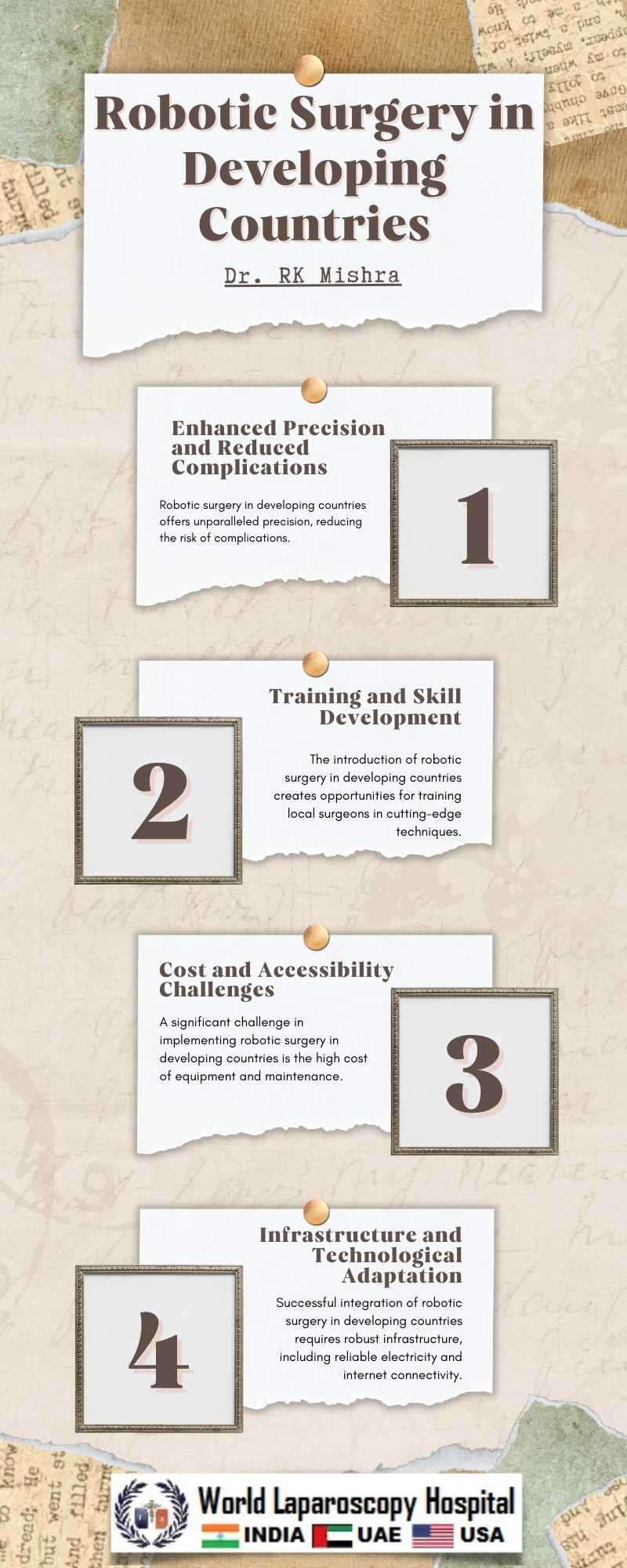Robotic Surgery in Developing Countries: Opportunities and Challenges
Robotic Surgery in Developing Countries: Opportunities and Challenges
Introduction
In the realm of medical advancements, robotic surgery stands as a pinnacle of innovation, combining precision, minimization of human error, and enhanced recovery times. However, its integration into developing countries' healthcare systems presents a unique set of opportunities and challenges. This essay explores the potential benefits and hurdles of implementing robotic surgery in these regions.

Opportunities
1. Enhanced Precision and Reduced Complications: Robotic surgery offers unparalleled precision, which is crucial in complex procedures. This can lead to reduced complications and better outcomes, particularly important in developing countries where post-operative care might be limited.
2. Training and Skill Development: The introduction of robotic surgery in developing countries provides an excellent opportunity for local healthcare professionals to acquire new skills. This knowledge transfer can elevate the overall quality of healthcare services.
3. Reduced Infection Rates: Robotic surgeries are minimally invasive, which significantly lowers the risk of infections – a paramount advantage in areas where post-operative care and infection control might be suboptimal.
4. Remote Surgery Potential: Robotic surgery could eventually enable remote operations, allowing surgeons from developed countries to assist or perform surgeries in remote areas without being physically present. This can be a game-changer for rural areas with limited access to specialized care.
Challenges
1. High Costs: The primary challenge is the cost of acquiring, maintaining, and operating robotic surgery systems. This financial burden can be overwhelming for healthcare systems in developing countries with limited budgets.
2. Infrastructure Requirements: Apart from the cost of the robots themselves, there's a need for appropriate infrastructure, including reliable electricity, specialized operating rooms, and maintenance facilities.
3. Training and Technical Expertise: Implementing robotic surgery requires extensive training for surgeons and supporting staff. Developing countries may face challenges in providing this level of training due to resource constraints.
4. Cultural and Ethical Considerations: In some regions, there might be cultural resistance or ethical concerns regarding the use of robots in medicine. Addressing these perceptions is crucial for the successful integration of robotic surgery.
Conclusion
Robotic surgery in developing countries offers a promising future with its potential to revolutionize surgical procedures, enhance skill sets, and improve patient outcomes. However, the path is fraught with challenges, primarily financial and infrastructural, which require innovative solutions and international cooperation. Addressing these challenges is essential to unlock the full potential of robotic surgery in enhancing global healthcare equity.
Introduction
In the realm of medical advancements, robotic surgery stands as a pinnacle of innovation, combining precision, minimization of human error, and enhanced recovery times. However, its integration into developing countries' healthcare systems presents a unique set of opportunities and challenges. This essay explores the potential benefits and hurdles of implementing robotic surgery in these regions.

Opportunities
1. Enhanced Precision and Reduced Complications: Robotic surgery offers unparalleled precision, which is crucial in complex procedures. This can lead to reduced complications and better outcomes, particularly important in developing countries where post-operative care might be limited.
2. Training and Skill Development: The introduction of robotic surgery in developing countries provides an excellent opportunity for local healthcare professionals to acquire new skills. This knowledge transfer can elevate the overall quality of healthcare services.
3. Reduced Infection Rates: Robotic surgeries are minimally invasive, which significantly lowers the risk of infections – a paramount advantage in areas where post-operative care and infection control might be suboptimal.
4. Remote Surgery Potential: Robotic surgery could eventually enable remote operations, allowing surgeons from developed countries to assist or perform surgeries in remote areas without being physically present. This can be a game-changer for rural areas with limited access to specialized care.
Challenges
1. High Costs: The primary challenge is the cost of acquiring, maintaining, and operating robotic surgery systems. This financial burden can be overwhelming for healthcare systems in developing countries with limited budgets.
2. Infrastructure Requirements: Apart from the cost of the robots themselves, there's a need for appropriate infrastructure, including reliable electricity, specialized operating rooms, and maintenance facilities.
3. Training and Technical Expertise: Implementing robotic surgery requires extensive training for surgeons and supporting staff. Developing countries may face challenges in providing this level of training due to resource constraints.
4. Cultural and Ethical Considerations: In some regions, there might be cultural resistance or ethical concerns regarding the use of robots in medicine. Addressing these perceptions is crucial for the successful integration of robotic surgery.
Conclusion
Robotic surgery in developing countries offers a promising future with its potential to revolutionize surgical procedures, enhance skill sets, and improve patient outcomes. However, the path is fraught with challenges, primarily financial and infrastructural, which require innovative solutions and international cooperation. Addressing these challenges is essential to unlock the full potential of robotic surgery in enhancing global healthcare equity.
4 COMMENTS
Dr. Balwant S Aithani
#1
Jan 13th, 2024 6:29 am
Robotic surgery in developing countries holds immense promise, poised to revolutionize procedures, elevate surgical skills, and uplift patient outcomes. Yet, financial and infrastructural hurdles loom large. Innovative solutions and international collaboration are imperative to overcome obstacles and realize the transformative potential, advancing global healthcare equity.
Dr. Radheshyam Mishra
#2
Jan 14th, 2024 7:26 am
Robotic surgery holds transformative promise in developing countries, revolutionizing procedures, advancing skills, and elevating patient outcomes. Overcoming financial and infrastructural hurdles demands innovative solutions and international collaboration, essential for unlocking its full potential and fostering global healthcare equity.
Dr. Arun Ashok
#3
Jan 15th, 2024 11:25 am
Robotic surgery holds promise in developing countries, revolutionizing procedures, enhancing skills, and improving outcomes. Overcoming financial and infrastructural challenges demands innovative solutions and international cooperation, essential for unlocking robotic surgery's potential in advancing global healthcare equity.
Dr. Himanshu Pithadiya
#4
Jan 18th, 2024 9:14 am
Robotic surgery holds promise in developing countries, revolutionizing procedures, enhancing skills, and improving outcomes. Financial and infrastructural challenges must be met with innovative solutions and international cooperation to unlock its full potential in enhancing global healthcare equity.
| Older Post | Home | Newer Post |

